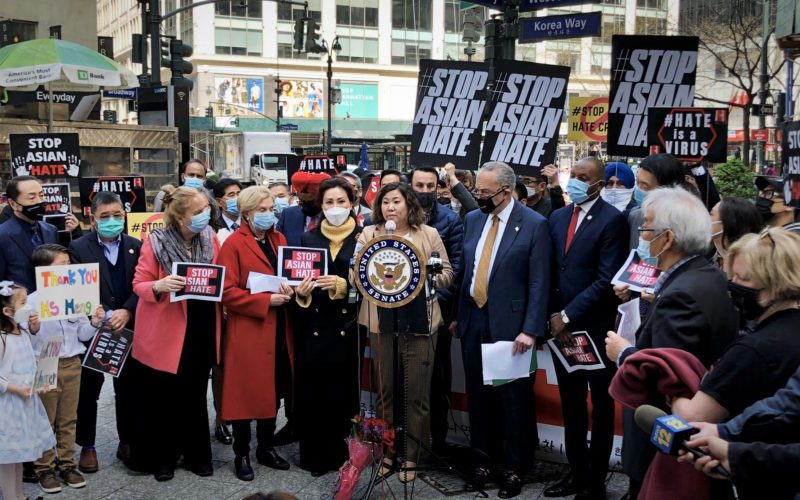Sign up here to receive The Yappie‘s weekly briefing on Asian American + Pacific Islander politics and support our work by making a donation.
The U.S. House of Representatives approved a final version of the COVID-19 Hate Crimes Act on Tuesday. The bill, aimed at curbing the yearlong spike in violence against Asian Americans and Pacific Islanders (AAPI), now goes to President Joe Biden’s desk.
The bipartisan measure, spearheaded by Rep. Grace Meng (D-New York) and Sen. Mazie Hirono (D-Hawaii), passed by a vote of 364 to 62 after soaring through the Senate last month with near unanimous support. White House Press Secretary Jen Psaki tweeted that Biden was "pleased" with the vote and confirmed that the president will sign the bill into law later this week.
"I commend my colleagues in the House for taking action to combat the despicable and sickening acts hate and violence against Asian Americans, and for having the Asian American community’s back as we fight this xenophobia and racist attacks,” Meng said in a statement.
The modest legislation—backed by most AAPI lawmakers, several national Asian American advocacy groups, and the Biden administration—directs the U.S. Department of Justice to expedite the review of coronavirus-related hate crimes and bolsters support for state and local law enforcement agencies responding to hate incidents.
The bill is also designed to encourage better data collection and reporting, and includes an expansion of public outreach efforts to make hate crime information more accessible to Asian American communities.
Passage of the COVID-19 Hate Crimes Act marks Congress’ first substantial legislative effort to address rising anti-Asian hate during the start of the coronavirus pandemic. Stop AAPI Hate, an organization that compiles hate incident reports against AAPIs, said in its latest update that the number of hate incidents in its database, ranging from verbal harassment to physical assaults, “increased significantly from 3,795 to 6,603 during March 2021.” AAPI women reported 64.8% of all hate incidents, the group said.
Tuesday’s vote also comes a little more than two months after a white gunman killed eight people, including six Asian women, at several Atlanta-area spas, shaking the Asian community and highlighting the violence experienced by Asian women.
The bill’s passage commemorates what would have been Vincent Chin’s 66th birthday. Chin was murdered in 1982 after two white men bludgeoned him to death, wanting to punish Japanese people for so-called stealing their jobs.
Some activists and experts, however, warn that the legislation will reinforce policing and disproportionately target marginalized people—including Black, brown, trans and queer, sex worker, and low-income commuities, as well as Southeast Asians, who also face high incarceration and deportation rates in the U.S.
In a statement published by Jenn Fang’s blog “Reappropriate,” more than 85 Asian American and LGBTQ advocacy groups said that “relying on law enforcement and crime statistics does not prevent violence” and urged Congress to shift resources from law enforcement to community-based solutions.
“We join and amplify the movement rejecting hate crime laws as a solution to violence, building upon the work of organizations like the Sylvia Rivera Law Project, INCITE! Women of Color Against Violence, and other BIPOC-led movements against criminalization and mass incarceration,” the statement read. “We call on our communities to demand more in this moment to address root causes and create true systemic change that does not rely on law enforcement.
“This is not about more policing. It’s about making sure the police are prepared to respond when a hate crime victim comes to them for help,” said Rep. Judy Chu (D-California), chair of the Congressional Asian Pacific American Caucus (CAPAC). "I am so grateful to my CAPAC colleagues Rep. Meng and Sen. Hirono for their leadership in passing this bill and for giving us the tools to help protect our communities from hate.”
This article has been updated with statements from members of the Congressional Asian Pacific American Caucus.









